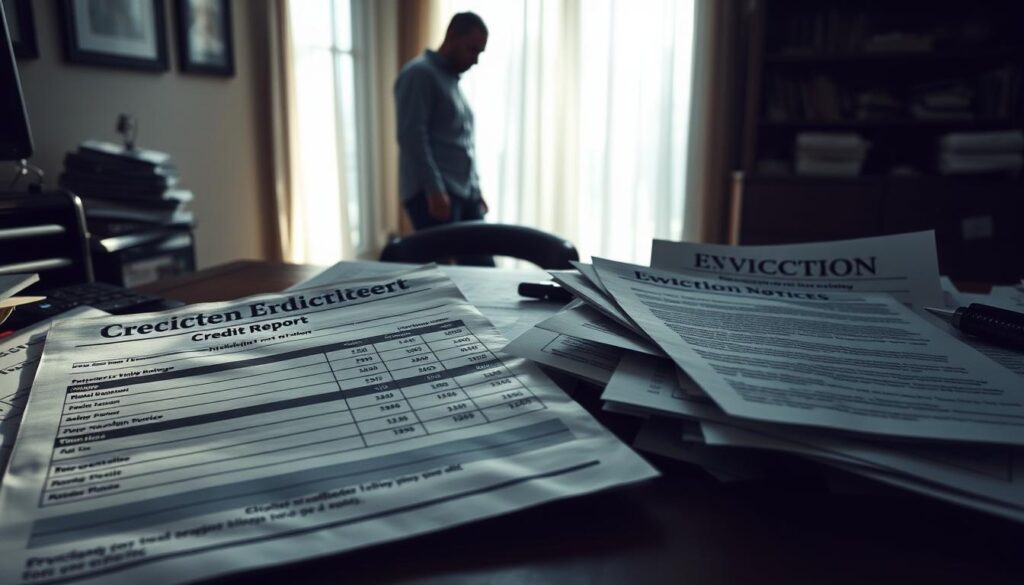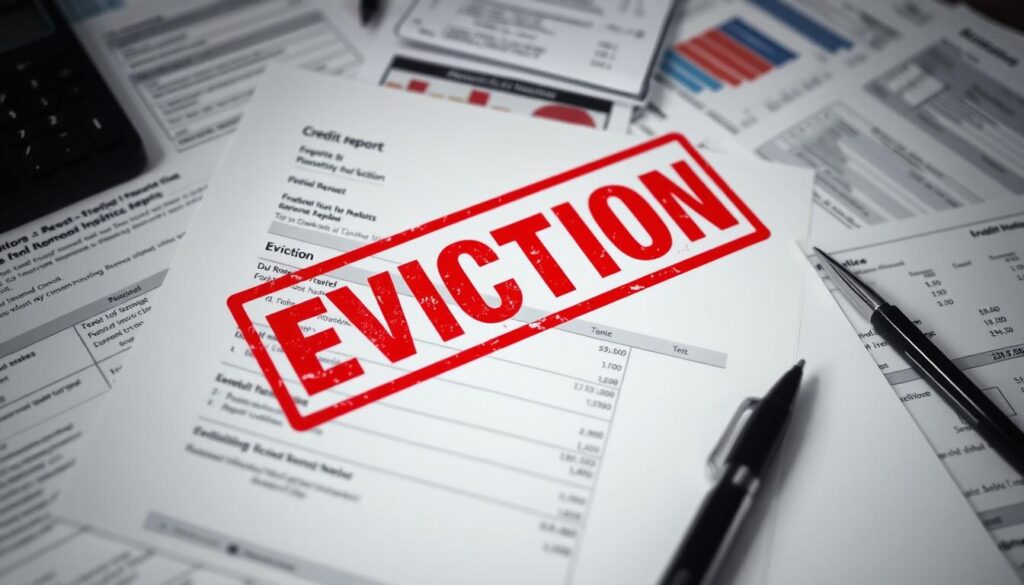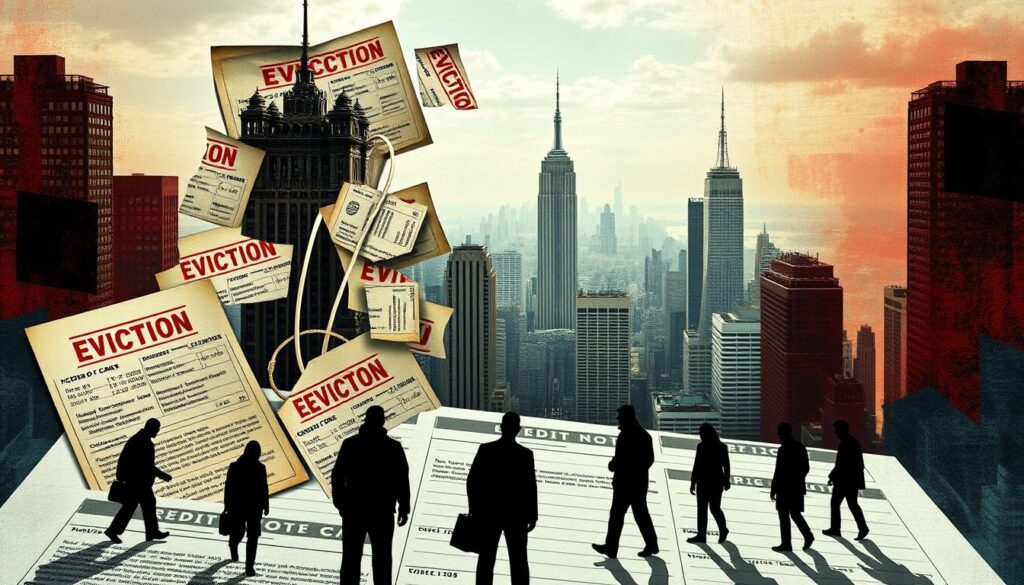Evictions can seriously impact your credit report and future housing options. They might affect your ability to get credit too. Let’s explore how evictions are reported and what you can do about it.
We’ll look at how evictions show up on credit reports. We’ll also discuss ways to lessen the damage and rebuild your credit.
Key Takeaways
- Evictions can be reported on your credit report, negatively impacting your credit score.
- Tenant screening reports used by landlords often include information about past evictions.
- The reporting process and timelines for evictions on credit reports vary across different credit bureaus.
- Strategies exist to address and potentially remove evictions from your credit history.
- Rebuilding your credit after an eviction is possible, but it requires diligence and patience.
Understanding Evictions and Credit Reports
Evictions and credit reports can greatly affect your financial health. Understanding their connection is vital. Let’s explore how evictions impact your credit score.
What is an Eviction?
An eviction is when a landlord legally removes a tenant from a rental property. This can happen if rent isn’t paid or lease terms are broken.
Evictions can harm a tenant’s finances, including their eviction credit report and rental history credit.
The Impact of Evictions on Credit Scores
Landlords may report evictions to credit bureaus, hurting the tenant’s credit score. This can make getting housing, loans, or new credit accounts harder.
The impact’s severity depends on factors like the eviction’s timing and details.
“Evictions can have a lasting impact on an individual’s financial well-being, making it crucial to understand the implications and take proactive steps to mitigate the damage.”
Knowing about evictions and credit reports helps maintain a strong financial profile. Stay informed and address issues quickly to work towards a better financial future.
Evictions and Traditional Credit Reports
Evictions can significantly impact your credit report. They show up as entries on your eviction credit report. Understanding how they’re reported is crucial for managing your credit profile.
Landlords report evictions to major credit bureaus: Experian, Equifax, and TransUnion. Most evictions appear on your rental history credit within 30 to 60 days. This happens even if you resolve the issue with your landlord.
- Evictions appear as “collection accounts” on credit reports. This indicates failure to pay rent or comply with lease terms.
- An eviction entry can lower your credit score by several points. The impact depends on your overall credit history.
- Evictions on credit reports make it harder to secure future housing. Landlords often check eviction credit report and rental history credit during applications.
Knowing how evictions affect credit reports is vital. This knowledge helps you prepare and take steps to protect your credit profile.

Tenant Screening Reports: A Landlord’s Perspective
Landlords use tenant screening reports to evaluate potential renters. These reports offer insights into an applicant’s rental history, credit, and eviction records. They help landlords make informed decisions to protect their properties.
What Information Do Tenant Screening Reports Contain?
Tenant screening reports include various data points about prospective tenants. These help landlords assess the risk and reliability of applicants.
- Credit history and credit scores
- Employment and income verification
- Previous rental history, including any eviction records
- Criminal background checks
- Verification of identity and social security number
Evaluating Rental History and Public Records
Landlords focus on an applicant’s rental history credit and eviction public records. On-time rent payments and responsible property care are positive indicators. These suggest a tenant will be reliable and trustworthy.
Late payments, property damage, or prior evictions can signal potential issues. Such records may lead landlords to consider other applicants.
| Rental History Factors | Impact on Landlord’s Decision |
|---|---|
| Consistent on-time rent payments | Viewed positively as a reliable tenant |
| History of property damage or lease violations | Raises concerns about potential future issues |
| Previous evictions | Can be a significant deterrent for landlords |
Tenant screening reports help landlords choose suitable tenants for their properties. This process aims to create a positive rental experience for everyone involved.
Would An Eviction Be On My Credit Report
Evictions may appear on your credit report, but it’s not always certain. The impact of an eviction on your credit can vary. Understanding this can help you plan your next steps.
Factors Determining Eviction Reporting
Several factors influence whether an eviction shows up on your credit report. These include the type of eviction proceeding and its timing. The credit reporting agency also plays a role in this process.
Formal evictions filed with the court are more likely to be reported. Evictions typically appear after a court judgment or writ of possession. Not all credit bureaus may record eviction information.
Even if an eviction isn’t on your credit report, it may show up on tenant screening reports. Landlords often use these reports to evaluate rental applications.
Potential Impact on Credit Scores
An eviction can significantly lower your credit score, possibly by 100 points or more. It’s considered a negative public record and can stay on your report for seven years.
Landlords and lenders may see an eviction as a sign of financial instability. This can make it harder to get future housing or loans.
| Credit Reporting Agency | Eviction Reporting Process | Typical Impact on Credit Score |
|---|---|---|
| Experian | Evictions are typically reported once the court has issued a judgment or writ of possession. | Drops of 100 points or more are common. |
| Equifax | Evictions may be reported as part of a tenant’s rental history or as a public record. | Significant declines in credit scores are likely. |
| TransUnion | Evictions are reported as part of a tenant’s rental history and may be considered a negative public record. | Credit scores can drop significantly, making future rental and credit applications more challenging. |
If you’ve been evicted, know how it might affect your credit report. Take steps to lessen long-term consequences. Seek professional financial advice to help rebuild your credit.

The Reporting Process for Evictions
Eviction reporting on credit reports can be complex. It’s vital to understand when an eviction might show up on your credit report. This knowledge helps you handle tough situations better.
When Do Evictions Appear on Credit Reports?
Eviction reporting involves court filing, judgment, and credit bureau notification. An eviction lawsuit alone doesn’t automatically appear on your credit report. The final court-ordered eviction usually triggers the reporting process.
Reporting evictions agencies may take weeks or months to update records after court proceedings. This delay can cause confusion about when the eviction actually appears on your eviction credit report.
Not all evictions end up on credit reports. Landlords can choose whether to report an eviction. Some may not report if the tenant tried to fix the problem.
Credit Bureaus and Eviction Records
Credit bureaus play a key role in tracking eviction records. Experian, Equifax, and TransUnion each have unique policies for reporting evictions. Understanding these policies can help you manage your credit effectively.
How Long Do Evictions Stay on Credit Reports?
An eviction can stay on your credit bureaus evictions for up to seven years. This impacts your ability to rent or get credit during that time.
Potential landlords and creditors can see this information on your eviction credit report. It’s crucial to know how long this record will be visible.
- Experian: Evictions can stay on your credit report for up to seven years from the date of filing.
- Equifax: Eviction records are generally reported for up to seven years from the date of the court judgment.
- TransUnion: Evictions are typically reported for up to seven years from the date of the court ruling or the date the eviction was filed, depending on state laws.
The exact timeframe may vary by state and credit bureau. Knowing these timelines helps you understand how evictions affect your credit bureaus evictions.

Knowing how credit bureaus handle evictions helps you rebuild your credit. It’s important to address any eviction issues on your report promptly.
Being proactive can improve your chances of securing future housing. Don’t let past evictions hold you back from new opportunities.
Mitigating the Impact of Evictions
An eviction on your credit report can hinder your ability to rent or get loans. But don’t worry! There are ways to lessen its impact and rebuild your credit.
Strategies for Addressing Evictions on Credit Reports
First, check your credit report for accuracy. Dispute any errors with credit bureaus to potentially remove the eviction. You can also try negotiating with your former landlord to seal the eviction record.
Building a strong rental history is crucial. Find landlords who’ll give you a chance. Pay rent on time and get positive references to offset the credit score impact eviction.
Be honest about your past when renting after eviction. Explain what happened and how you’ve improved your finances. This openness can help build trust with potential landlords.
“The key to mitigating the impact of an eviction is to be proactive, transparent, and demonstrate your commitment to being a responsible tenant.”
Stay persistent and learn from your experiences. With time and effort, you can overcome eviction challenges and rebuild your credit history.
Renting After an Eviction
An eviction doesn’t have to stop you from finding a new rental property. Landlords may check your rental history and credit. But you can use strategies to improve your chances of getting a new lease.
Landlord References and Credit Checks
Landlords often review credit reports and rental history during background checks. Be honest about your eviction and provide context. Highlight any positive changes in your finances or living situation to show reliability.
Look for landlords who accept alternative proof of trustworthiness. This could include references from previous landlords or employers. Building a good rental history after eviction can help in your home search.
| Renting After Eviction | Landlord References and Credit Checks |
|---|---|
|
|
An eviction is a setback, but it doesn’t define your future rental chances. With effort and commitment, you can rebuild your rental history. You can overcome challenges and find a new home.
“An eviction is not the end of the road; it’s an opportunity to demonstrate your resilience and commitment to becoming a responsible tenant.”
Eviction Public Records and Transparency
Eviction public records play a vital role in transparency. These records are kept by government agencies and courts. They can greatly affect people who face or recover from evictions.
Eviction records are open to the public. This promotes fairness in the rental housing market. However, it can make it hard for people to move on after an eviction.
Local courts and housing authorities maintain eviction records. You can access them online or in person. Landlords often use tenant screening services to check these records.
An eviction record can make finding new housing tough. Landlords may see you as a risky tenant. This can happen even if the eviction was years ago.
- Eviction records are typically maintained by local courts and housing authorities, and can be accessed through online databases or in-person record requests.
- Landlords often utilize tenant screening services that compile and report on eviction records, which can influence their decisions to rent to prospective tenants.
- The presence of an eviction record, even if it occurred years ago, can make it significantly more difficult for individuals to find new rental housing, as landlords may view them as a higher-risk tenant.
The openness of eviction public records has pros and cons. It aims for fairness but can cause long-term issues. Understanding these records is key for rebuilding rental history.
| Eviction Public Record Transparency | Impact on Renters |
|---|---|
| Eviction records are considered public documents | Can make it difficult to secure new rental housing |
| Records are maintained by local courts and housing authorities | Landlords may view individuals with eviction records as higher-risk tenants |
| Records can be accessed through online databases or in-person requests | Eviction records can have long-term consequences, even if the incident occurred years ago |
Eviction public records transparency is a complex issue. It aims for fairness but can create challenges. Understanding these records is crucial for navigating the rental market.
Preventive Measures: Avoiding Evictions
Talking to landlords early can stop evictions. By finding solutions together, you can avoid negative effects on your rental history. Open communication helps maintain good relationships with property owners.
Communicating with Landlords and Negotiating
If you’re struggling to pay rent, talk to your landlord right away. Honest conversations can lead to understanding and solutions. Here are some helpful strategies:
- Reach out to your landlord promptly to discuss the situation and explore options.
- Provide clear and transparent information about your financial circumstances.
- Negotiate a payment plan or temporary rent reduction that works for both parties.
- Demonstrate your willingness to work collaboratively to find a resolution.
- Explore the possibility of a temporary lease modification or extension.
Negotiating with your landlord can prevent eviction’s harmful effects. This approach protects your credit report and rental history. It also shows your commitment to resolving issues.
| Approach | Benefits |
|---|---|
| Prompt Communication | Establishes open dialogue and demonstrates proactivity |
| Transparent Sharing of Information | Builds trust and enables landlords to better understand your situation |
| Collaborative Negotiation | Leads to mutually agreeable solutions and preserves the landlord-tenant relationship |
These preventive measures help maintain a good rental history. This is key when communicating with landlords and negotiating future housing. Taking action early can save you from many problems.

Legal Considerations and Tenant Rights
Understanding your legal rights as a tenant is vital. Knowing these rights can empower you to address rental issues effectively. This knowledge is especially important for tenant screening reports and eviction records.
Evictions must follow specific legal protocols. Landlords must provide proper notice and follow due process. As a tenant, you can challenge an unlawful or unjustified eviction.
Familiarize yourself with state and local tenant protection laws. These laws cover notice periods, eviction grounds, and legal procedures. Understanding your rights regarding personal information collection is crucial.
If facing eviction, seek legal counsel. This ensures your rights are protected throughout the process. Stay informed about your legal rights as a tenant.
Being proactive can help mitigate an eviction’s impact on your credit report. It can also affect future rental opportunities. Advocate for your rights to navigate the rental market confidently.
- Familiarize yourself with your state and local tenant protection laws, which may include provisions for notice periods, grounds for eviction, and the legal procedures involved.
- Understand your rights regarding the collection and use of your personal information, including tenant screening reports and public records related to evictions.
- If you are facing an eviction, seek legal counsel to ensure your rights are protected and to navigate the legal process effectively.
“Knowledge is power when it comes to protecting your rights as a tenant. Understand the legal process and don’t hesitate to seek assistance if you face an eviction.”
Rebuilding Credit After an Eviction
An eviction can hurt your credit score, making it hard to find housing or get loans. But don’t worry! You can rebuild your credit with a smart plan and good money habits.
Steps to Improve Credit Scores over Time
Pay all your bills on time to rebuild your credit after an eviction. This shows creditors you’re reliable and can manage money well.
Lower your debt-to-income ratio by paying off balances and avoiding new credit. This improves your credit utilization, which greatly affects your credit score.
Consider talking to a financial advisor to create a debt management plan. They can help you find the best way to handle your specific situation.
Build a diverse credit history by opening new accounts like secured credit cards. Credit-builder loans can also help you show you can manage different types of credit.

